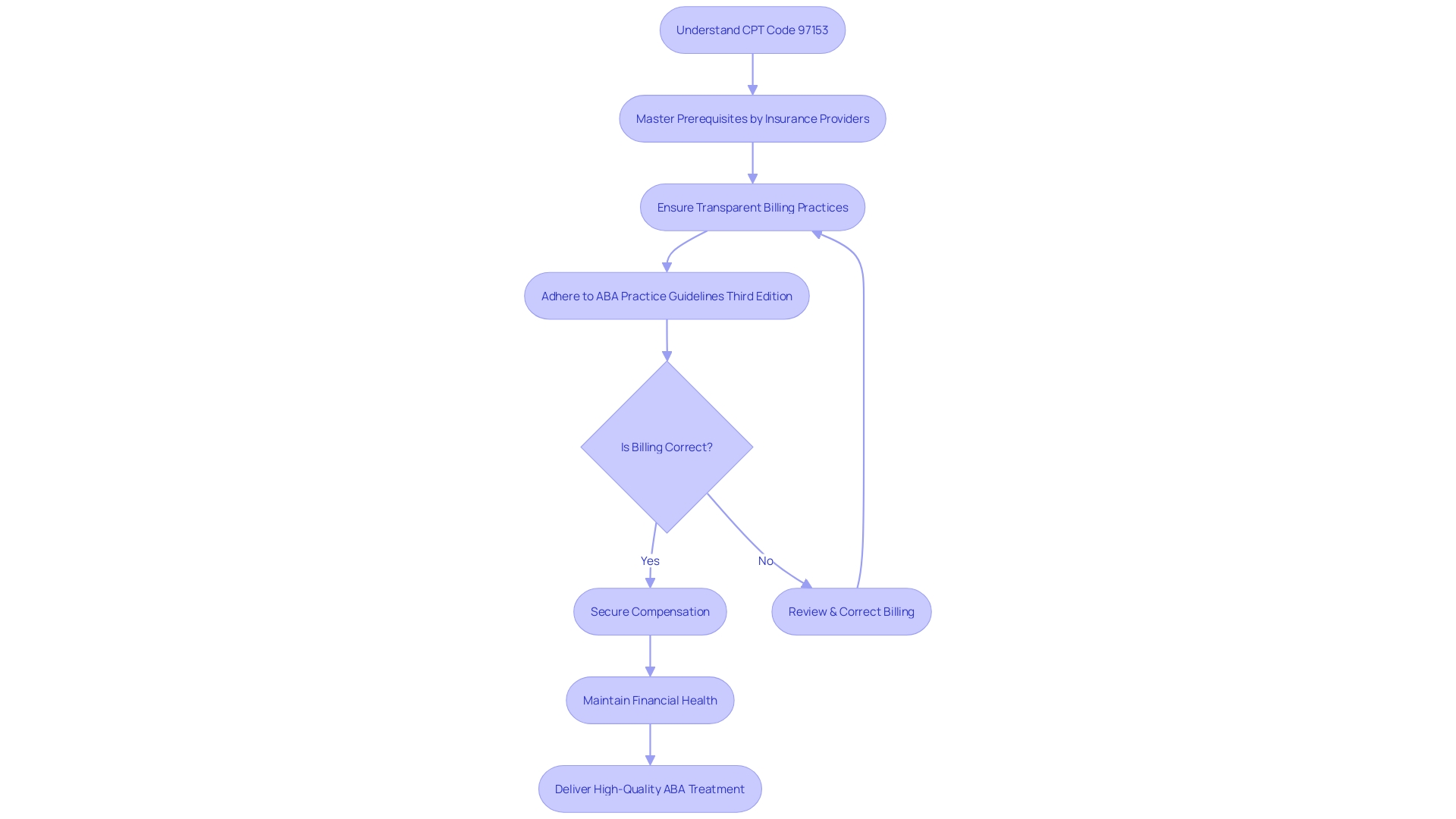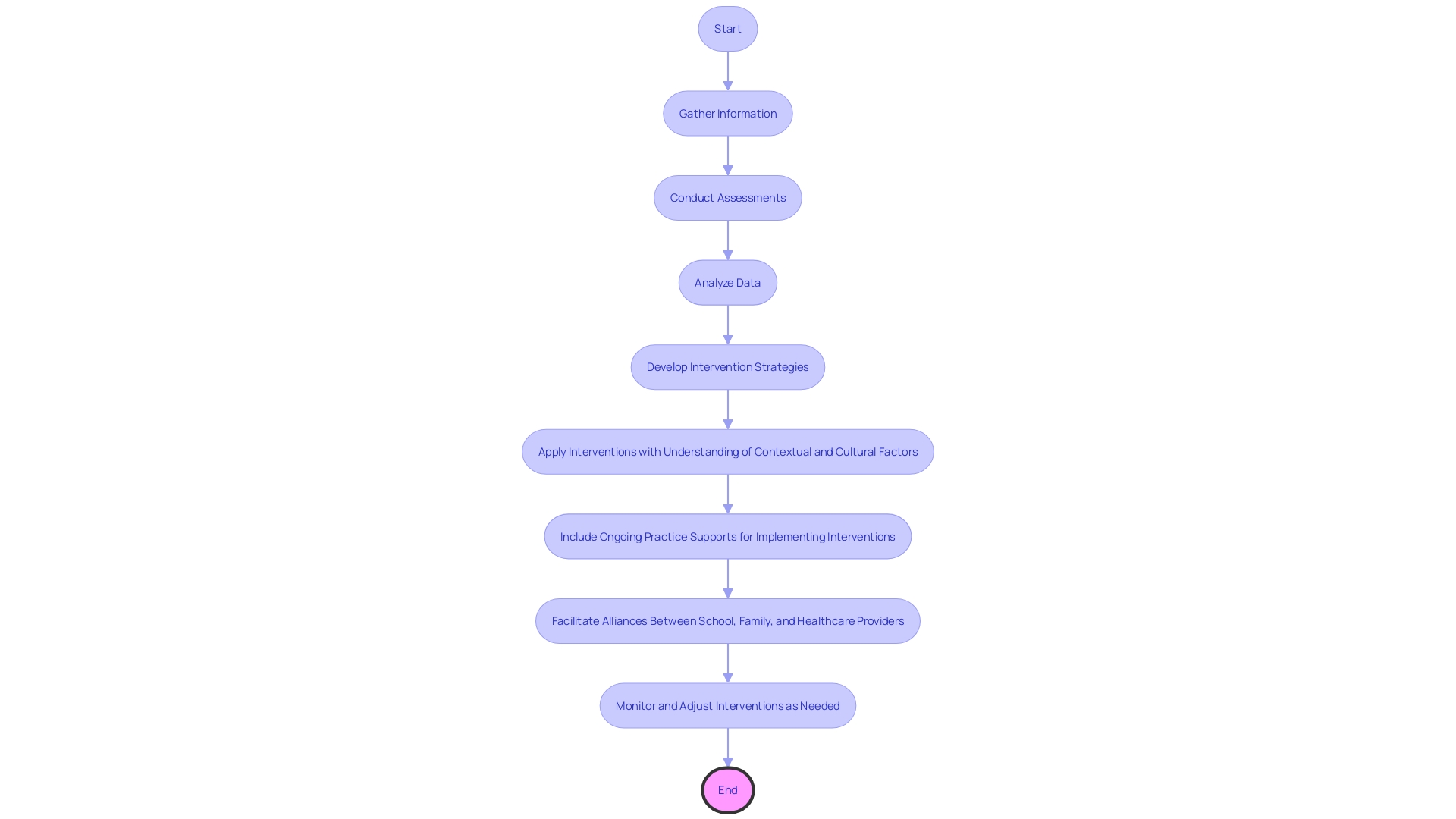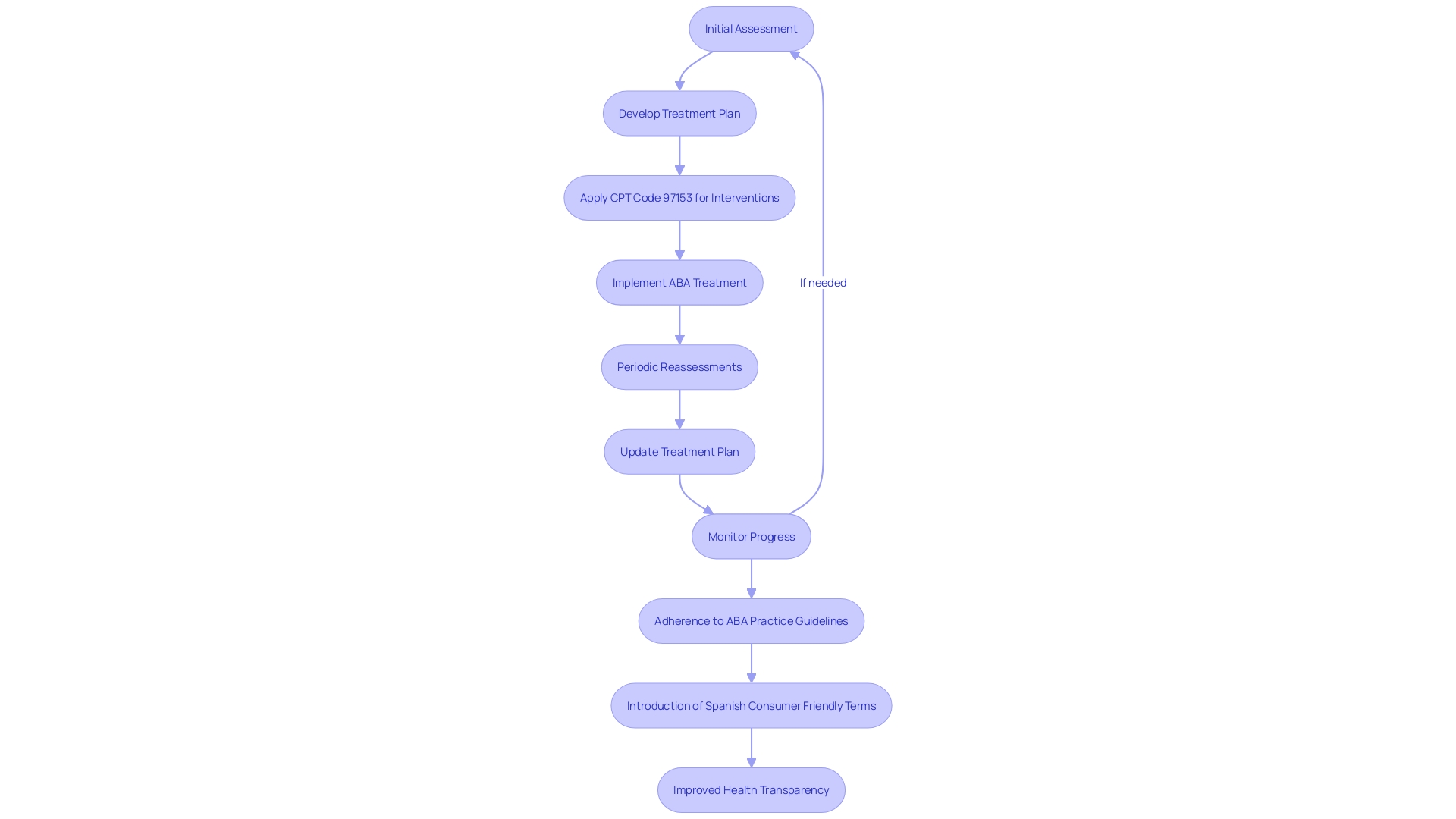Introduction
CPT Code 97153 is a crucial tool in the realm of ABA therapy billing, allowing therapists to accurately document and charge for their services. This code plays a vital role in securing proper reimbursement from insurance entities and ensuring that the specialized needs of individuals with autism spectrum disorder and other developmental challenges are met. In this article, we will explore the key components of CPT Code 97153, its usage and billing implications, documentation requirements, who can administer and bill for it, common scenarios for its use, and best practices for accurate billing and reimbursement.
By understanding and effectively utilizing this code, ABA therapists can navigate the complexities of billing and provide the best possible care for their clients.
What is CPT Code 97153?
CPT Code 97153 is a beacon of precision in the intricate landscape of ABA therapy billing. This code is meticulously crafted for ABA therapists to document and charge for their services with pinpoint accuracy, encompassing a spectrum of therapeutic interventions aimed at enhancing adaptive behavior among individuals grappling with autism spectrum disorder and a variety of developmental challenges. It stands as a critical conduit for securing rightful reimbursements from insurance entities, including Medicare and Medicaid, as well as paving the way for the latest breakthroughs in mental health care as outlined by experts like Dr. Carlene Macmillan. As the landscape of special education evolves, recognizing diverse conditions from emotional disturbances to orthopedic impairments, CPT Code 97153 becomes an ever more vital tool in ensuring that the specialized needs of children and adults with disabilities are met with the support they rightfully deserve.
Key Components of CPT Code 97153
CPT Code 97153 reflects the multifaceted nature of ABA intervention, a crucial approach for individuals with autism. This code is deeply integral to the reimbursement process for health care services, recognized by government and commercial insurers alike. As we embrace a new era in mental health care, understanding the components of this code becomes increasingly important, especially with the release of the third edition of the ABA Practice Guidelines by CASP. These guidelines are not only procedural; they demonstrate a dedication to quality in autism treatment, as emphasized by CASP CEO Lorri Unumb, who highlights the importance of high-quality implementation of ABA intervention. The changing field of autism diagnosis, as pointed out by Dr. Jan Blacher, further highlights the importance of a nuanced approach to treatment, acknowledging the varied needs of the autism spectrum. These developments, alongside the adoption of the social model of disability, challenge practitioners to reflect and adapt their practices within the framework of ABA to effectively support each unique individual.
Usage and Billing for CPT Code 97153
Understanding the intricacies of CPT Code 97153 is a vital component for ABA therapists to secure correct compensation for their services. Mastery of the specific prerequisites dictated by insurance providers is key. This code, used to describe healthcare services for reimbursement purposes, has wide-ranging implications for the financial health of ABA practices.
For instance, the story of Meier & Marsh Professional Therapies exemplifies the importance of proficient billing systems. Despite their expertise in patient care, their billing processes were less efficient, which led them to partner with a billing service that offered a data-rich dashboard and responsive support. Similarly, ABA therapists must ensure their billing is transparent, easily accessible, and up-to-date with the latest coding standards.
These standards are underscored by the release of the third edition of the Applied Behavior Analysis (ABA) Practice Guidelines by CASP, which aim to provide ABA standards of care for stakeholders. The guidelines stress the importance of high-quality ABA treatment and its effective implementation, which involves proper billing practices as a cornerstone of quality care. As the sector encounters rapid technological changes and increasing competition, adhering to correct billing practices is not only about reimbursement but also about maintaining the standard of care that defines professional ABA services.

Documentation Requirements for CPT Code 97153
In the nuanced field of ABA treatment, accuracy in recording treatment procedures is not merely a matter of adhering to CPT Code 97153; it is a fundamental aspect of intervention that can influence a young individual's growth. Records must meticulously capture each session's goals, the individual's response to interventions, and any necessary adjustments. This level of specificity is important for assessing the efficacy of the treatment, particularly given the range of actions and requirements among individuals with autism. For example, interventions that focus on detrimental actions such as head-banging necessitate careful supervision to guarantee the safety and well-being of the individual. On the other hand, interventions that target less risky but socially frowned upon actions should be evaluated for their lasting effects on the individual's psychological well-being, while preventing the risk of exhaustion or any adverse consequences. By maintaining thorough records, therapists not only comply with the necessary standards but also add to a broader collection of evidence that informs optimal practices and aids in customizing future treatments to meet the individual needs of each child.
Who Can Administer and Bill for CPT Code 97153?
CPT Code 97153 is a critical component in the field of ABA, reserved for use by highly trained professionals. This code corresponds to services that are integral to the assessment and intervention strategies which are foundational to ABA treatment. To bill for these services, practitioners must demonstrate not only their credentials but a profound understanding of the therapeutic process, ensuring that the care delivered is not only effective but also adheres to a standard of excellence. The focus on quality and the need for specialized training highlight the dedication to offering excellent care to those in need of ABA services.

Common Scenarios for Using CPT Code 97153
Applied Behavior Analysis (ABA) treatment, acknowledged for its efficiency in addressing individuals with autism, depends on exact methodologies to improve learning and decrease challenging behaviors. Central to the success of ABA is the structured use of CPT Code 97153. Professionals employ this code in a variety of critical situations, including the initial assessment of the individual, periodic reassessments, updates to the treatment plan, and the continuous monitoring of progress. The application of this code ensures that each therapeutic intervention is tailored to the individual's evolving needs, marking milestones in their developmental journey. The recent release of the third edition of the ABA Practice Guidelines by the Council of Autism Service Providers underscores the importance of maintaining high standards of care, emphasizing the need for accurate implementation of such codes for effective treatment outcomes. As the field of ABA evolves, so does the recognition of the diversity in learning and communication styles, prompting advancements like the introduction of Spanish Consumer Friendly Terms by the American Medical Association to improve health transparency. This commitment to inclusivity and clarity in medical data communication is a testament to the ongoing efforts to make ABA treatment accessible and understandable to all, ensuring that every individual receives the support they need to thrive.

Differences Between CPT Code 97153 and Other ABA Therapy Codes
CPT Code 97153 stands out as a dedicated tool for assessing and treating adaptive deficits in ABA therapy. This code is unique from others that might target areas like social skills or reduction of conduct. Adaptive actions encompass daily living skills necessary for independence and social integration. When kids struggle with adaptive actions, it may show up in manners like banging their head or smearing food, which can be upsetting for both the young one and caregivers. The purpose of utilizing CPT Code 97153 is to modify these behaviors, improving the individual's capacity to adjust and react to their surroundings in healthier ways.
However, the effectiveness of any ABA therapy, including those billed under CPT Code 97153, hinges on a personalized approach. A case in point involves the lawsuit against Gottlieb's team, which underscores the necessity of tailoring interventions to each child's unique context, particularly in complex family situations. This personalized approach is critical to prevent exacerbation of psychological distress.
Furthermore, the appearance of conduct issues during challenging periods, such as the pandemic, has emphasized the significance of evidence-based techniques like the Interview Informed Synthesized Functional Analysis (IISCA). These methods are designed to identify the function of problematic behaviors and inform the development of effective interventions that are considerate of the individual's specific needs.
Dr. Aleksandra Hollingshead, an associate professor of special education, highlights the importance of involvement and customized educational approaches for individuals with autism and significant disabilities. Her research aligns with the principles of ABA, where understanding each individual's distinct requirements is crucial to their achievements.
As we navigate this evolving landscape, it's crucial for providers to not only understand the nuances of codes like 97153 but also to embrace the shift towards more personalized, function-based interventions that are sensitive to the individual experiences of children and their families.
Best Practices for Accurate Billing and Reimbursement
To optimize the financial aspects of ABA therapy, adhering to best practices for CPT Code 97153 is essential. This involves a clear understanding of insurance guidelines, meticulous documentation of services, prompt claim submission, and adept handling of denials or disputes. By embracing a proactive approach, similar to that of the Center for Autism and Related Disorders' talent acquisition strategy, ABA therapists can adapt to industry demands and ensure proper billing. It's critical to harness strategies such as denial management, which entails a systematic process to pinpoint and prevent recurring claim denials, ultimately safeguarding revenue streams. With the healthcare landscape evolving, as seen with the new ABA treatment guidelines by CASP, staying informed and agile in billing practices is more important than ever. Moreover, learning from successful cases like Meier & Marsh Professional Therapies, which improved their billing outcomes by leveraging data-rich solutions and responsive support, can guide ABA professionals towards more efficient and transparent billing operations.
Conclusion
In conclusion, CPT Code 97153 is a crucial tool for ABA therapists to accurately document and charge for their services. It ensures proper reimbursement and meets the specialized needs of individuals with autism and other developmental challenges.
Understanding the key components, usage, and billing implications of CPT Code 97153 is essential for ABA therapists. Documentation requirements contribute to a larger body of evidence that informs best practices and tailors future therapies to each child's unique needs.
This code is reserved for highly trained professionals committed to providing superior care. It is used in critical scenarios, tailoring each therapeutic intervention to the individual's evolving needs.
While distinct from other ABA therapy codes, CPT Code 97153 emphasizes the importance of personalized interventions and evidence-based methods. Considering each child's unique context and needs is essential for effective treatment outcomes.
Adhering to best practices for accurate billing and reimbursement optimizes the financial aspects of ABA therapy. This includes understanding insurance guidelines, meticulous documentation, prompt claim submission, and adept handling of denials or disputes.
By understanding and utilizing CPT Code 97153 effectively, ABA therapists navigate billing complexities and provide the best possible care. It empowers therapists to ensure individuals with autism and other developmental challenges receive the support they deserve.




